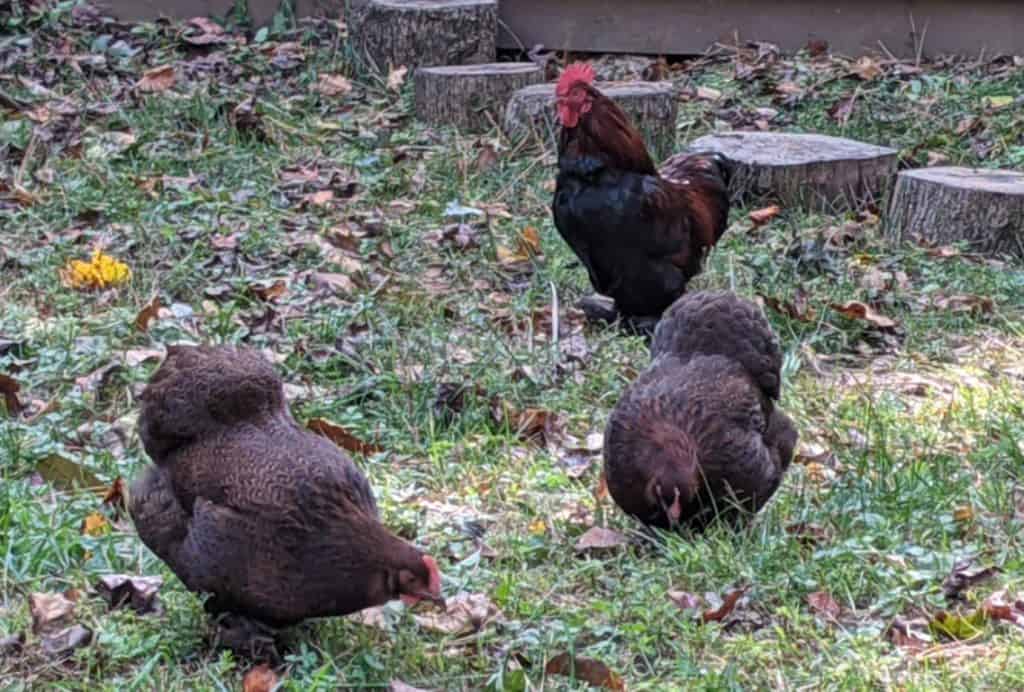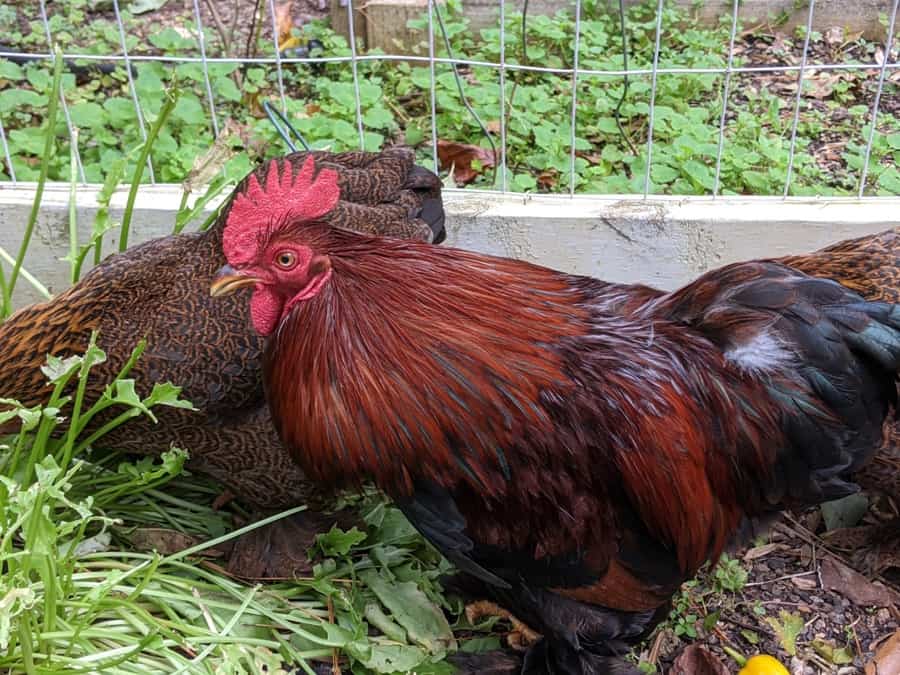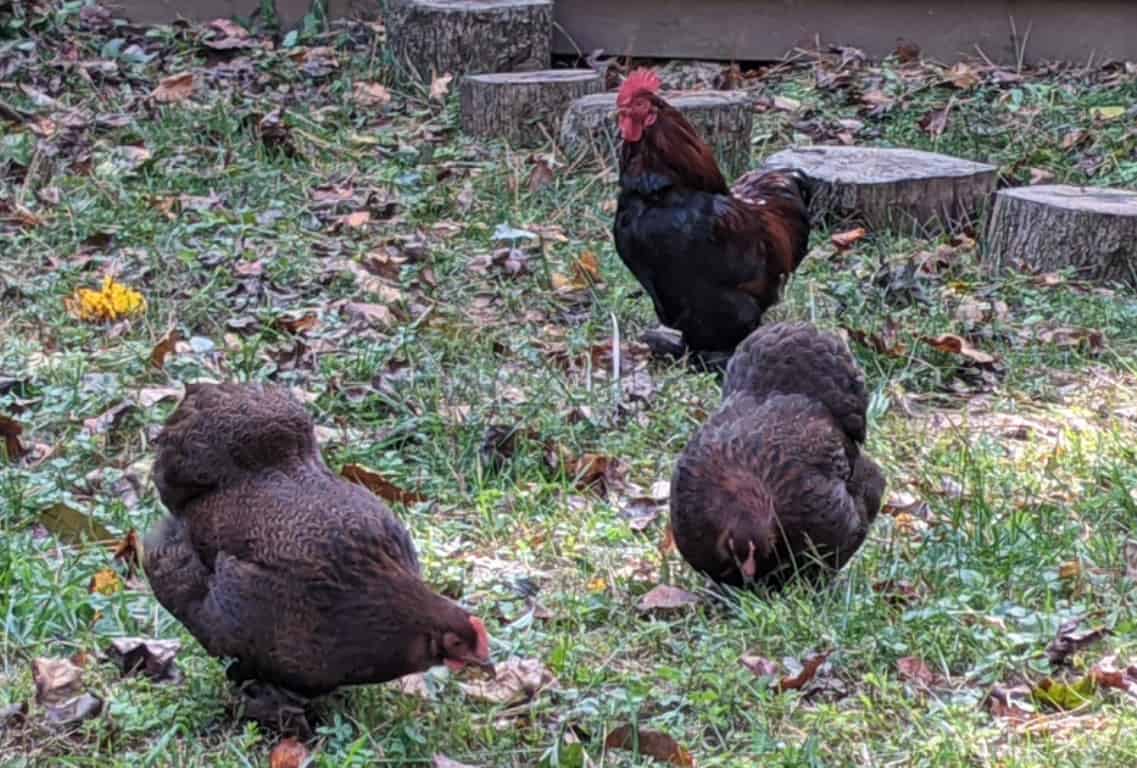
If you’re thinking of adding a rooster to your flock then you have several things to consider. There are many pros and cons of having a rooster.
Whether you should get one will depend on a variety of factors such as location, flock size, and several other factors.
There are challenges when keeping a rooster. I have listed out all benefits and disadvantages I can think of since I have had rooster protecting my flock.
Pros and benefits of having a rooster
1. A rooster protects the flock from danger
A roosters typical day includes constantly keeping a lookout for danger. Hens get distracted eating, scratching, and pecking for food.
A rooster will alert the flock when danger such as hawks, owls, raccoons, possums, coyotes, or weasels are nearby. Rooster is great for alerting the hens to run for cover when a predator arrives.
A good rooster will also keep the hens in line. He will make sure the hens don’t wander too far off from the group. If they do he will crow to make them come back to the group.
2. A rooster fertilizes eggs for hatching
If you are want to have baby chicks then you will need a rooster for egg fertilization. A rooster is not required if you just want farm fresh eggs every morning from your hens.
3. Roosters maintain a pecking order
A rooster is the unquestioned leader of the flock. Without a rooster one of the Hens must be the mama hen and maintain the pecking order for the flock.
4. A rooster helps hens find food
A good rooster will alert a flock of hens to food he finds. whether it be a tasty grub, worms or other snack. Roosters lookout for hens to make sure they are well fed and taken care of.
5. Relaxed hens lead to better egg production
Though there is some debate it is generally assumed that a healthy relaxed hens lead to better production of eggs. By having a rooster around this allows the egg layers to focus on finding food. The hens look to the rooster for protection and leadership.
6. Roosters can act as an alarm clock
Roosters do not crow early in the morning because of first light but rather they have a natural internal circadian alarm clock. This internal alarm clock will cause them to crow regardless of their external environment.
7. A rooster can alert is an owner that danger is nearby
The sound clucks and squawks a rooster makes when he senses danger is very distinct compared to his normal crowing throughout the day. You can hear what this sounds like in the video below.
Cons of having a Rooster
1. Roosters are loud
If you live closes to neighbors chances are they won’t appreciate the crowing a rooster makes early in the mornings and throughout the day. My own rooster is really loud and crows at random times on a daily basis and not just in the mornings.
2. Roosters can be aggressive
Roosters are have a natural aggression used to protect their flock. Our agressive roo has attacked my leg a couple times and has tried to attack my 5 year old daughters leg. He usually does this when she is loud and starts running around causing him to become upset.
You can remove or trim the spurs of a rooster to lessen and potential damage. So far my own rooster has not actually hurt anyone. He tends to be scared of adults most of the time due to our size.
You can see a rooster chase our daughter and scare her in the video below.
3. Roosters can scare young children
Since my rooster has tried to attack my daughter she has become frightened of him. She does not like to play in the yard if he is not locked up in the coop.
Take this under consideration if you have small children.
4. Roosters can cause hens to loose feathers
When a rooster mounts a hen aggressively it can cause her to lose tail feathers. A chicken saddle can help protect the hen from a roosters spurs. In some cases when a rooster over mates with a hen it can put her in life-threatening danger.
If you have enough hens this should not be to big of a problem. Having at least 5 or 6 hens should lower the chances of this problem.
5. It may be against your local city ordinance
Depending on the city you live in you may need a permit to have a rooster. In many cities, you can be fined for having a rooster due to the noise they make each morning.
These fines can reach over 1,000 dollars in some cities so make sure you know the local codes in your town. If you live in a suburban area there is a good chance you are not supposed to have a rooster.

How long can a rooster live?
Backyard roosters have been known to live anywhere from 7 to 10 years of age sometimes longer depending on how they are cared for and the breed.
At what age do roosters get spurs?
Spurs can start developing on a cockerel (young rooster) as early as three months and can take up to a year to fully develop depending on the breed.
Conclusion
Roosters are great for protecting hens from danger, add color to a flock and give the group more of a personality.
Make sure you weigh the pros and cons of having a rooster before making a final decision otherwise you may have to find a new home for the roo if it doesn’t work out.

